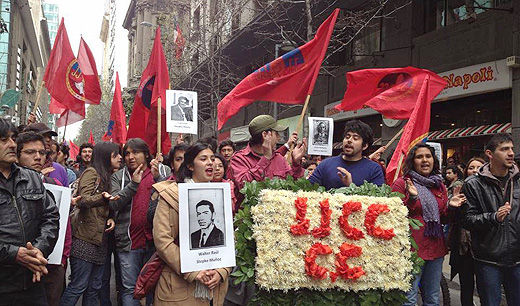
Today, September 11, is the 40th anniversary of the bloody military coup that ended the life of Chile’s socialist president, Salvador Allende, and began the long dictatorship of General Augusto Pinochet. Two months from now, on November 17, another socialist president, Michelle Bachelet, is likely to be elected with the support of the same left-wing forces that brought Allende to power in 1970.
Allende, from the Chilean Socialist Party, implemented progressive policies that threatened the interests of U.S. based transnational corporations in the fields of copper mines, which were nationalized, and communications. These corporations, aided by the Nixon administration, worked hard to destabilize his government and the Chilean economy. Finally, on Sept. 11, 1973, a military coup ousted Allende, who died in the fighting.
Subsequently, at least 3,000 left wing Chileans were murdered, tens of thousands tortured and many more driven into exile. The Pinochet regime, working with other South American dictatorships and the United States through “Operation Condor,” sent its assassins to kill exiled Chilean political figures such as army leader General Carlos Prats, murdered in Argentina in 1974, and Allende’s foreign minister, Orlando Letelier, murdered along with American colleague Ronni Moffit in the middle of Washington D.C., on Sept. 21, 1976.
Among those murdered was Bachelet’s father, an air force brigadier general, who was tortured to death by Pinochet’s henchmen. Michelle Bachelet was also imprisoned and tortured.
Pinochet stepped down in 1988, after negotiating a deal he thought would protect himself and his family from prosecution. Elections followed in 1989.
The initial elected governments after Pinochet’s resignation were those of the centrist “Concertación” which included the Socialist Party, the Christian Democratic Party, the Party for Democracy and the Social Democratic Radical Party, but not the Communist Party. The communists felt that the ideologically heterogeneous makeup of the Concertación, and the concessions it made to Pinochet in exchange for restoring elections, made it necessary for communists to act in opposition and run separate candidacies.
The Concertación’s candidates won the elections of 1989, 1993, 1996 and 2000 and 2005. The president elected in 2000 was the Socialist Party’s Michelle Bachelet. In that election, the Communist Party supported an independent dissident socialist candidate, Tomas Hirsch Goldschmidt, while the right-wing candidate was Sebastian Piñera of the National Alliance, who has connections with the Pinochet regime. Bachelet narrowly won the runoff.
Bachelet ran a popular center-left administration, in spite of protests by students, indigenous people and others over policies left over from the Pinochet days. She made headway on issues of labor and women’s rights. However, the Chilean constitution does not permit reelection for consecutive terms. In the elections of 2009, the Concertación candidate was Christian Democrat Eduardo Frei Ruiz-Tagle, and Piñera ran again as the right wing candidate. The Communist Party nominated Jorge Arrate. Piñera and Frei Ruiz-Tagle made it into the runoff, which Piñera won by a small margin.
Piñera’s term has been wracked by massive demonstrations of students, workers, indigenous Mapuche people and environmentalists, all of whom object strongly to the president’s right-wing policies that are seen as having roots in the Pinochet dictatorship. Students, supported by labor, have protested against privatization of education, and for quality schools for all. Environmental protests have taken aim at water privatization schemes that threaten to harm the environment. The Mapuche indigenous group, fighting to recover lost lands, has been subjected to repressive Pinochet-era “anti-terrorism” legislation.
The Socialist Party is running former President Bachelet as its candidate (the ban on reelection only applies to consecutive terms). This time, the Communist Party has decided to support her candidacy. The main right-wing candidate is Evelyn Rose Matthei Fornet, Piñera’s former secretary of Labor and Social Security, running under the banner of the Independent Democratic Union. There are several other smaller-scale candidacies. At writing, polls are showing Bachelet far ahead.
The Chilean election is of great regional and international importance. There is a great struggle in Latin America and the Caribbean going on at present. On one side is the Bolivarian dynamic, which tries to build solidarity among the nations of Latin America and the Caribbean, reduce their domination of their, and find forms of internal development based on human solidarity and social justice, not neo-liberalism. Aligned with this position are Argentina, Bolivia, Brazil, Cuba, Ecuador, Nicaragua, Paraguay, Uruguay, Venezuela and some of the small Caribbean states. On the other side is the Pacific Alliance, including countries with conservative governments dependent on the United States: Mexico, Colombia, Chile and Peru (Costa Rica and Panama are associate members). This alliance strongly supports neo-liberal, free trade policies and U.S. foreign policy. Geographically, the Pacific Alliance states are well positioned to be part of the Trans Pacific Partnership.
If Bachelet, with communist and socialist support, wins the election, she is likely to reorient Chile toward the Bolivarian dynamic and away from U.S. domination. There are powerful people who will want to try to prevent this.
Photo: On the 40th anniversary of the fascist coup, Juventudes Comunistas de Chile JJCC demand truth and justice for the dead whom they honor with a procession near the presidential palace La Moneda in Santiago, Chile. (Corrected caption, 9.16.13)












Comments